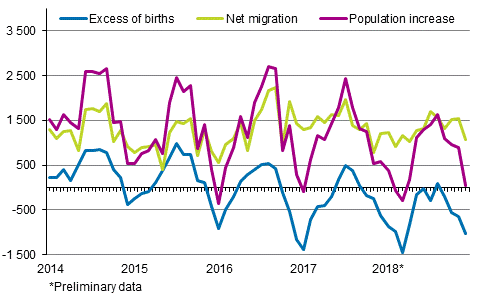Published: 29 January 2019
Decrease in birth rate still continues
According to Statistics Finland's preliminary data for 2018, Finland's population was 5,521,773 at the end of the year. During 2018 Finland's population increased by 8,643 persons, which is 2,780 less than in 2017. The reason for the population increase was migration gain from abroad: the number of immigrants was 15,631 higher than that of emigrants. The excess of births was negative as the number of births was 6,988 lower than that of deaths. The preliminary total fertility rate was the lowest in the measuring history, 1.40.
Population increase by month 2014–2018*

According to the preliminary statistics during 2018, a total of 47,307 children were born, which is 3,014 fewer than in 2017. The number of deaths was 54,295, which is 573 higher than one year earlier.
Altogether 31,720 persons immigrated to Finland from abroad and 16,089 persons emigrated from Finland during 2018. The number of immigrants was 77 lower and the number of emigrants 884 lower than in the previous year. In all, 8,571 of the immigrants and 10,788 of the emigrants were Finnish citizens.
According to the preliminary data, the number of inter-municipal migrations totalled 289,223 in 2018. Compared with the previous year, the increase was 1,384 migrations according to the municipal division of 2018.
Same-sex marriages took legal effect in March 2017. A total of 211 women and 120 men entered into marriage in which the spouse was of the same sex during 2018. In all, 149 women and 80 men changed their registered partnership into marriage.
According to preliminary data by region, the population grew in 2018 only in Uusimaa, Pirkanmaa, Varsinais-Suomi, North Ostrobothnia and Åland.
The population grew most in absolute numbers in Uusimaa, where it grew by 17,895 persons. The next largest increase in population was seen in Pirkanmaa, 3,263 persons. Relative to the population, population increase was highest in Åland, 11.0 per mil, in Uusimaa, 10.7 per mil and in Pirkanmaa, 6.4 per mil. Population loss was highest in absolute numbers in the region of Etelä-Savo that lost 2,554 persons of its population. The population of Kymenlaakso decreased by 2,000 persons, which was the second biggest population loss. Relative to the population, the biggest population loss was found in Etelä-Savo, 17.5 per mil.
Most migration gain from intramunicipal and international migration was collected by Uusimaa, 14,067 persons and Pirkanmaa, 3,605 persons. Most migration gain in relative terms based on total net migration was attained by Åland, 10.6 per mil and Uusimaa, 8.4 per mil.
In absolute numbers, migration loss from total net migration was biggest in the region of Etelä-Savo, 1,272 persons. In the region of Kymenlaakso the loss was 781 persons. In relative terms, the biggest migration loss from total net migration was found in the region of Etelä-Savo, 8.7 per mil of the population.
During 2018, migration between regions numbered 136,875. The positive gain from migration between regions was seen in Uusimaa, Pirkanmaa, Varsinais-Suomi and Åland. In absolute numbers, the highest gain from migration between regions was received by Uusimaa, 6,747 persons. The relative migration gain was highest in Pirkanmaa, 5.1 per mil of the population.
Migration loss from migration between regions was biggest in absolute numbers in the region of Etelä-Savo, 1,519 persons. Migration loss from migration between regions was biggest in relative terms also in the region of Etelä-Savo, 10.4 per mil of the population.
Source: Preliminary population statistics, Statistics Finland
Inquiries: Joni Rantakari 029 551 3249, Joonas Toivola 029 551 3355, info@stat.fi
Director in charge: Jari Tarkoma
Publication in pdf-format (322.2 kB)
- Tables
-
Tables in databases
Pick the data you need into tables, view the data as graphs, or download the data for your use.
Appendix tables
- Appendix table 1. Preliminary data on vital statistics by month of occurence 2018 (29.1.2019)
- Appendix table 2. Vital statistics, final data 2005 - 2017 and preliminary data 2018* (29.1.2019)
- Appendix table 3. Comparison between preliminary vital statistics in 2018 and 2017 (29.1.2019)
- Appendix table 4. Preliminary vital statistics by region 2018 and change compared to 2017 final data, quarters 1 - 4 (29.1.2019)
- Appendix table 5. Preliminary data by region on immigrants and emigrants according to country of departure/destination 2018, quarters 1 - 4 (29.1.2019)
- Figures
-
- Appendix figure 1. Live births by quarter 1996 - 2017 and preliminary data 2018* (29.1.2019)
- Appendix figure 2. Deaths by quarter 1996 - 2017 and preliminary data 2018* (29.1.2019)
- Appendix figure 3. Intermunicipal migration by quarter 1996 - 2017 and preliminary data 2018* (29.1.2019)
- Appendix figure 4. Immigration by quarter 1996 - 2017 and preliminary data 2018* (29.1.2019)
- Appendix figure 5. Emigration by quarter 1996 - 2017 and preliminary data 2018* (29.1.2019)
Updated 29.01.2019
Official Statistics of Finland (OSF):
Preliminary population statistics [e-publication].
ISSN=2243-3627. December 2018. Helsinki: Statistics Finland [referred: 5.3.2026].
Access method: http://stat.fi/til/vamuu/2018/12/vamuu_2018_12_2019-01-29_tie_001_en.html

